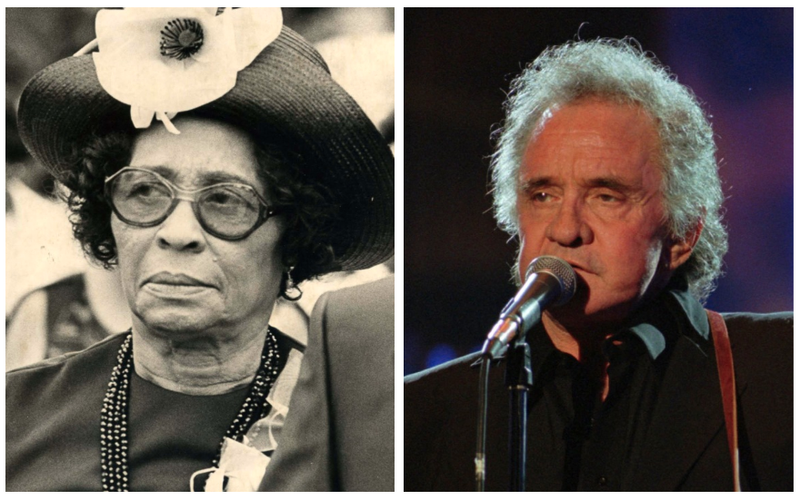Statues of Little Rock Nine mentor Daisy Gatson Bates and musician Johnny Cash would replace two existing ones representing Arkansas in the U.S. Capitol under legislation that sailed through the state Senate on Monday.
Monday was a state holiday honoring Bates and George Washington.
Without any debate, the Senate voted 33-0 to send Senate Bill 75 by Sen. David Wallace, R-Leachville, to the House for further consideration. Sen. Bill Sample, R-Hot Springs, voted present. Last month, Sample suggested that Sam Walton would be a much better person to represent the state because he created Walmart Inc., the largest retail business in the world.
Wallace told reporters he believes the prospects for his bill in the House are good.
"How could you turn down Daisy Bates and Johnny Cash?" he said.
House Speaker Matthew Shepherd, R-El Dorado, said, "I think that there's been a little bit of discussion about it, clearly not as much as there's been on the Senate end.
"Now that we have a bill headed this way ... we'll take a look at it. We'll see what the will of the House is at that point," he said. "Any names that I've heard on our end, it's been more of a discussion of names that have already been brought up on the Senate end."
SB75 won the endorsement of the Senate State Agencies and Governmental Affairs Committee on Thursday, where it had failed twice within a six-day period last month.
[RELATED: Complete Democrat-Gazette coverage of the Arkansas Legislature]
The measure was resurrected after senators on Feb. 6 listed their first and second choices on paper. Bates was the first choice and Cash the second choice.
Other names nominated by senators included former Lt. Gov. Maurice "Footsie" Britt; former U.S. Sen. Hattie Wyatt Caraway; musician James C. Morris, better known as Jimmy Driftwood; Navy SEAL Adam Brown; former state lawmakers William Henry Grey and James T. White; and comedians Norris Goff and Chester Lauck, better known by their radio act as "Lum and Abner."
According to SB75, the General Assembly finds that Bates served as a civil-rights activist, writer and publisher who worked and documented the struggle to end segregation in Arkansas and is an inspiration through her lifelong career.
SB75 also states that the General Assembly finds that Cash is a legendary musician who sold more than 90 million records, is one of the few people to be recognized in both the Country Hall of Fame and Rock and Roll Hall of Fame, and received numerous awards for his work. Cash articulated his life in Arkansas through his music and made historic contributions to the musical history of the state and country, according to the bill.
In 1864, Congress passed a law inviting each state to submit up to two bronze or marble statues to be placed in what is now known as Statuary Hall. As the number of states grew, the statues spread to other areas of the Capitol.
In 1917, the Arkansas Legislature approved a marble statue of Uriah M. Rose, who helped found the Rose Law Firm and American Bar Association. In 1921, the Legislature approved a marble statue of James P. Clarke, who was governor from 1895-97 and a U.S. senator from 1903-06.
Clarke is an ancestor of former state Rep. Clarke Tucker, a Democrat from Little Rock who unsuccessfully challenged Republican U.S. Rep. French Hill of Little Rock.
Tucker has condemned a statement Clarke made in his 1894 gubernatorial campaign that, "The people of the South looked to the Democratic Party to preserve the white standards of civilization." Tucker has also said new statues are needed.
Under SB75, the secretary of state's office would meet the requirements of federal law to replace both statues in the U.S. Capitol and coordinate with the state Capitol Arts and Grounds Commission to facilitate the process.
For the new statues, the commission would receive funds, both public and donations, for the completion, transport, display and maintenance of them. The state also would select sculptors, approve the design, material, production and method of display; remove and relocate the existing two statues; and organize an event unveiling the statues.
Wallace said, "I don't know what it is going to cost. But it will come from private funds. It will have no cost to the Arkansas taxpayer."
Wallace said he suspects the new statues would cost at least a few million dollars.
"What we have done is establish a vehicle for folks to have private fundraising and I have been led to believe that the money would be available right there," he said.
Wallace said he favors placing the existing statues in the Old Statehouse because "that was their era."
He said he's not sure when people could expect the existing statues to be placed.
"We are at just the crawling stage."
Information for this article was contributed by John Moritz of the Arkansas Democrat-Gazette.
Metro on 02/19/2019
